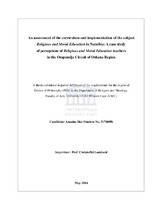| dc.description.abstract | This research study investigated the perceptions of Religious and Moral Education (RME) teachers in Namibia with regard to the implementation of the RME syllabus, Grades 5-10 in actual teaching and learning situations. It also examined to what extent pre-service and in-service training prepare these teachers to deal with the demands of the subject in their professional classroom situations. The relevance of the study was that the continuing process of curriculum development would benefit from specific knowledge of the perceptions of teachers and learners, regarding their problems and problem-solving, shortcomings in the system, pre-service and in-service training, and support services. The study took place amidst a global debate on paradigms in the teaching of religion and moral formation. It could therefore also contribute to a growing canon of literature with specific contributions based on empirical research.
The study reviewed literature in the field of religious and moral education, the official curricula and syllabi, as well as all other policy and training documents relating to the subject. A carefully sampled case study of teachers in public schools in the Ompundja Circuit of the Oshana Region was carried out. In 1990, under the new constitution, Namibia was declared a secular state, recognising all religions. This was contrary to the colonial period in which Christianity was the only recognised religion and taught under a Christian national ideology in an apartheid political setup. The new dispensation brought new challenges to the subject teachers because, in the past, most of them were only trained to teach Biblical Instruction/Biblical Studies. In the new constitution, the state neither favours nor neglects any of the religious orientations.
The context of the study was, thus, the appropriate choice for a particular paradigm in which religion and morality are studied at school level, based upon the principles of a multi-religious and multi-cultural society where both teachers and learners gain knowledge and understanding of other faiths and values; a culture of tolerance is encouraged and fostered; the rights of different religions and their moral values are respected and promoted; and learners are prepared for responsible citizenship | en_US |

